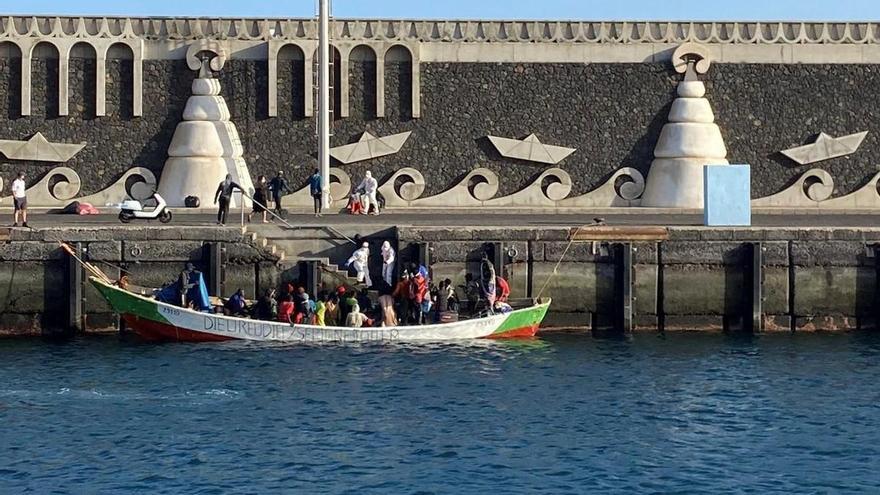
One of the survivors of cayuco that left Mauritania and was rescued on April 11, 2021 220 kilometers from El Hierro, after remain adrift for 18 days without water, gasoline or foodreported that at a given moment of the journey his despair was such that it led him to think: “Only God can save us.”
during the journey around 40 people of the nearly 60 who started the journey on the boat diedand in the first session of the trial held this Tuesday at the Provincial Court of Tenerife, a national police force that participated in the rescue also intervened.
The prosecution He sits four alleged skippers of the boat on the bench and requests 20 years in prison for each of them.
The agent reported that three helicopters were in charge of transferring the survivors to The iron and from there they were sent to Tenerife to be admitted to hospitals.
In the following days they tried to identify them by means of the bracelet that he put on them. Red Cross which they then compared with data from their clinical history.
They then carried out various interviews to see if they could tell them who had been the patrons of the trip, but these conversations were often useless since they all spoke languages that required interpreters to communicate with them and they only had those who spoke French.
From the interviews, it emerged that some did not want to be questioned, refused to identify the bosses or that on another occasion they had to do it through photographs.
The National Police indicated that, in general, they were willing to collaborate without having to offer them any benefit to regularize their situation in the country.
“In these cases we must have a lot of patience to get them to talk. But the account we got was almost always coincidental. They told us that the trip was going to last a maximum of five days but that in the end there were almost 20”. Each one paid 400 euros to make this journey.
At the time of the rescue in the cayuco there were four corpses and 19 survivors, of which thirteen required urgent medical assistance. They confirmed to the agents that the other bodies were thrown into the sea and that when the situation became desperate they were threatened if they dared to make any demands.
Police recall that they were in shock after what they described as “traumatic” experience, and when all but one recovered, they recognized without any doubt the defendants and the tasks they were undertaking.
The tasks were to drive the canoe, distribute food and water and take care of the GPS, and “curiously”, these were the last to be rescued because they were the ones in the best condition, according to the Prosecutor’s Office, because they hid food and drinks for them. .
A Senegalese citizen He recounted that in Mauritania he contacted a man to whom he gave the money that included food and water and nothing else, adding that he did not know much about the details because he spoke another language.
He confessed that they were very scared, that they had to drink water from the sea and because of that they became sick, and he recounted that when they died the bodies were thrown into the ocean without further consideration, he does not know if anyone kept their belongings.
“I thought that all of us who were there were going to die,” he said, and recalled that he had heard screams but did not understand the language and therefore cannot be sure that they were threats.
This immigrant occupied the back of the canoe from which he did not move during the entire journey, and could only sit or lie down. From this place he barely saw the faces of the ship’s skippers and he could not identify them with total certainty either.
He knew the person in charge of driving the cayuco but he said he was one of the deceased, he does not know if the bosses kept food and drink for themselves and he could not specify the number of deaths either.
The despair It got to the point that someone decided to jump into the sea, even though he was asleep at the time. “There were people there who were stronger than others,” said this immigrant, who justified the gaps in his story because he spent most of the journey in a state close to unconsciousness.
Today another of the survivors intervened who said that he did not have a life jacket either but he had a tarpaulin with which he managed to protect himself from the sun and the cold.
This immigrant identified in court, without any doubt, the captain and the one who had the GPS and had previously done so in photographs at the hospital.
But in general, he assured that he made the trip scared to death and in a state that now prevents him from remembering everything that happened. Contrary to what was assured by the police, the witnesses affirmed that they did not have an interpreter, they simply limited themselves to pointing their fingers at the faces that were familiar to them.
















